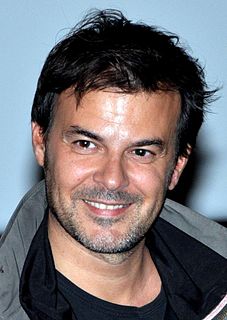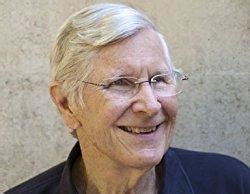A Quote by Louise J. Kaplan
It is an odd fact that what we now know of the mental and emotional life of infants surpasses what we comprehend about adolescents. . . . That they do not confide in us is hardly surprising. They use wise discretion in disguising themselves with the caricatures we design for them. And unfortunately for us, as for them, too often adolescents retain the caricatured personalities they had merely meant to try on for size.
Related Quotes
To me, the hope lies in adults forgetting about their retirement and turning toward the adolescents and helping pull the adolescents over that mysterious line drawn on the ground into adulthood. If we don't do that, the adolescents are going to stay exactly where they are for the next 30 or 40 years.
Valentine had long ago observed that in a society that expected chastity and fidelity, like Lusitania, the adolescents who controlled and channeled their youthful passions were the ones who grew up to be both strong and civilized. Adolescents in such a community who were either too weak to control themselves or too contemptuous of society's norms to try usually ended up being either sheep or wolves- either mindless members of the herd or predators who took what they could and gave nothing.
Adolescents' immature thinking makes it difficult for them to process the divorce. They tend to see things in black-and-white terms and have trouble putting events into perspective. They are absolute in their judgments and expect perfection in parents. They are likely to be self-conscious about their parent's failures and critical of their every move. They have the expectations that parents will keep them safe and happy and are shocked by the broken covenant. Adolescents are unforgiving.
Discretion is the perfection of reason, and a guide to us in all the duties of life; cunning is a kind of instinct, that only looks out after our immediate interests and welfare. Discretion is only found in men of strong sense and good understanding; cunning is often to be met with in brutes themselves, and in persons who are but the fewest removes from them.
The ubiquitous and acutely conscious presence of our adolescents is a major problem, especially since much of their consciousnessseems to be focused on sexuality--ours and theirs. They expect us to ignore them if they are kissing their dates in the family room; but let us so much as wink at one another, and they whistle loudly.
Adolescence is a time when children are supposed to move away from parents who are holding firm and protective behind them. When the parents disconnect, the children have no base to move away from or return to. They aren't ready to face the world alone. With divorce, adolescents feel abandoned, and they are outraged at that abandonment. They are angry at both parents for letting them down. Often they feel that their parents broke the rules and so now they can too.
Why do children want to grow up? Because they experience their lives as constrained by immaturity and perceive adulthood as a condition of greater freedom and opportunity. But what is there today, in America, that very poor and very rich adolescents want to do but cannot do? Not much: they can do drugs, have sex, make babies, and get money (from their parents, crime, or the State). For such adolescents, adulthood becomes synonymous with responsibility rather than liberty. Is it any surprise that they remain adolescents?
I've played people that are on the line of evil and good, but that's life. We are always playing with the good and the bad. I see them as people. I don't see them as caricatures. I try to not make them caricatures. Maybe I fail, but I try to see what' behind them. Would I play the hero? A superhero? I don't think so. But, I play good guys. There are some there, but you have to look.
In the ancient world individuals have sold themselves as slaves, in order to eat. So in society. Here is a witch-doctor who can save us from the sorcerers - a war-lord who can save us from the barbarians - a Church that can save us from Hell. Give them what they ask, give ourselves to them bound and blindfold, if only they will! Perhaps the terrible bargain will be made again. We cannot blame men for making it. We can hardly wish them not to. Yet we can hardly bear that they should.































